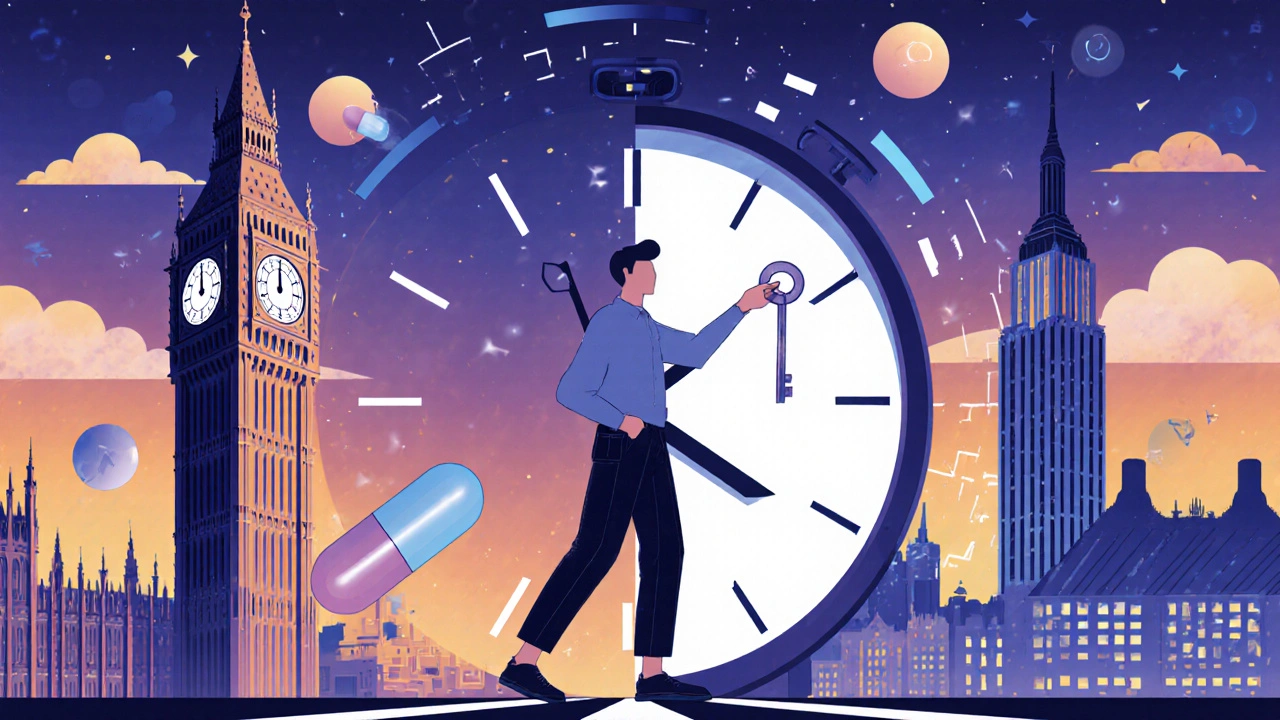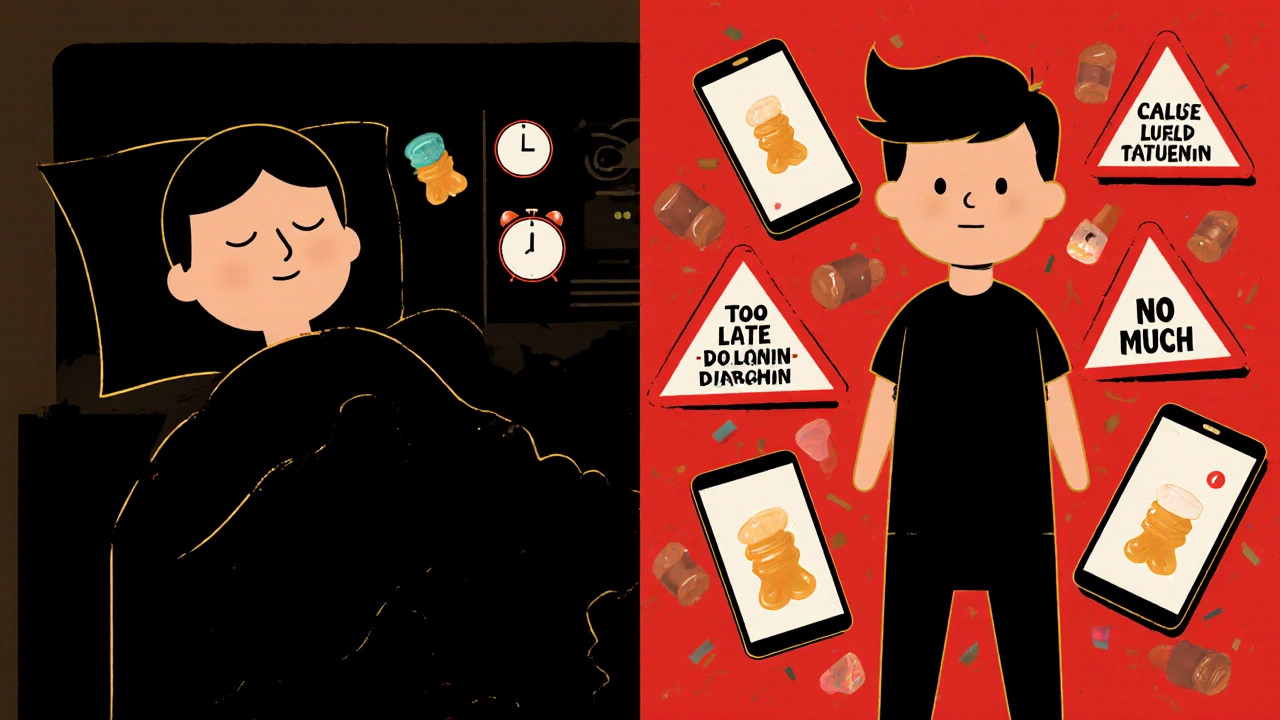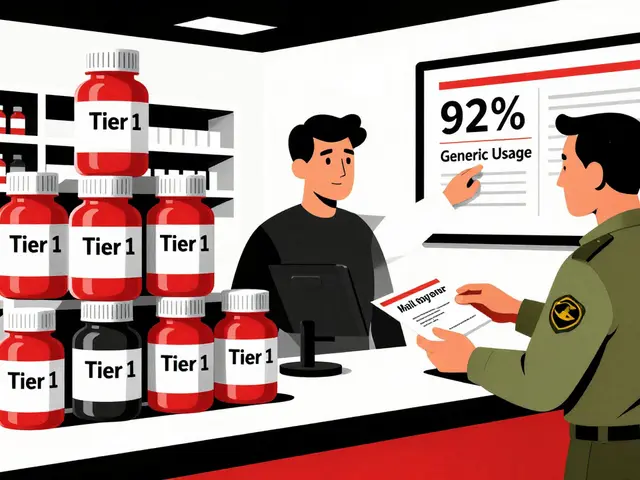Most people think melatonin is a sleeping pill. It’s not. It’s your body’s natural signal that it’s time for bed. When the sun goes down, your pineal gland releases melatonin - a hormone that tells your brain: darkness. No light. Time to wind down. But when you take it as a supplement, timing and dose matter more than you think. Too much? You’ll feel groggy all morning. Too late? You’ll shift your sleep cycle backward instead of forward. And if you’re using it for general insomnia, you might be wasting your money.
How Melatonin Actually Works in Your Body
Melatonin isn’t a sedative like Ambien or Lunesta. It doesn’t knock you out. Instead, it talks to two receptors in your brain - MT1 and MT2 - located in the suprachiasmatic nucleus, your body’s master clock. When melatonin binds to MT1, it quietly slows down brain activity, lowers your core body temperature by about half a degree, and makes you feel sleepy. MT2 does something different: it shifts your internal clock forward or backward, depending on when you take it. This is why melatonin works so well for jet lag. If you fly from London to New York (eastbound), your body still thinks it’s 3 AM. Taking 0.5mg of melatonin at 8 PM local time tells your brain: it’s nighttime here now. Studies show this can reset your rhythm in just two days. The same logic applies to shift workers. If you work nights and sleep during the day, melatonin taken before your daytime sleep can help your body accept that schedule. But here’s the catch: light kills melatonin. Blue light from phones, TVs, and LED bulbs suppresses its natural production. That’s why scrolling in bed makes it harder to fall asleep - your body isn’t getting the darkness signal it needs. Melatonin supplements can’t fix bad habits. They just help when your rhythm is already broken.What the Science Says About Effectiveness
A 2013 Cochrane review of 19 studies found melatonin reduces the time it takes to fall asleep by about 7 minutes on average. That’s not much compared to prescription sleep aids, which cut sleep onset by 20-30 minutes. But melatonin’s real strength isn’t speed - it’s timing. For people with Delayed Sleep Phase Syndrome (DSPS), where you naturally fall asleep at 2 AM or later, melatonin can shift your bedtime forward by 40 minutes to an hour. That’s huge. One Reddit user reported taking 0.5mg at 9 PM for three weeks and moved their sleep from 3 AM to 1 AM - without feeling hungover the next day. The American Academy of Sleep Medicine gives melatonin a conditional recommendation for DSPS and jet lag. For general insomnia? They say there’s not enough proof. That’s because most people with insomnia have anxiety, stress, or poor sleep hygiene - not a broken clock. Melatonin doesn’t calm your mind. It doesn’t fix caffeine after 3 PM. It doesn’t replace a dark, cool bedroom. A 2023 review in the Journal of Pineal Research confirmed: melatonin is a circadian tool, not a sleep drug. Use it for rhythm problems. Don’t use it for racing thoughts.Dosing: Less Is More
Most melatonin pills sold in the U.S. contain 3mg, 5mg, even 10mg. That’s 20 to 100 times more than your body naturally makes at night. Research shows doses above 0.5mg offer no extra benefit - and increase side effects. Start with 0.3mg to 0.5mg. That’s about the size of a grain of rice. Take it 2 to 3 hours before your target bedtime. For jet lag, take it at local bedtime for a few days before and after travel. For DSPS, take it 2-3 hours before your current bedtime, then gradually move the time earlier by 15-30 minutes each day. Taking it too late - say, at 11 PM - can actually delay your rhythm. That’s why some people feel worse after taking melatonin: they’re taking it at the wrong time. A 2021 BBC interview with UK sleep expert Dr. Neil Stanley put it bluntly: “Many people take melatonin at the wrong time or wrong dose, rendering it ineffective.”
Side Effects and Risks
Melatonin is generally safe for short-term use. But it’s not harmless. Common side effects include:- Next-day drowsiness (28% of users)
- Vivid dreams or nightmares (22%)
- Headaches (15%)
- Dizziness or nausea (less common)
The Supplement Problem: You Don’t Know What You’re Taking
Melatonin is sold as a dietary supplement in the U.S. That means the FDA doesn’t test it for purity, potency, or safety before it hits shelves. A 2022 ConsumerLab test of top-selling brands found melatonin content ranged from 83% to 478% of what was listed on the label. One pill claimed 3mg - it had 14mg. Another claimed 1mg - it had 0.2mg. In the UK and much of Europe, melatonin is a prescription-only drug (Circadin, 2mg prolonged-release). That’s because regulators know how messy the market is. In the U.S., you can buy it next to gummy vitamins - no doctor needed. But that freedom comes with risk. If you’re going to use it, choose brands that are third-party tested. Look for USP Verified, NSF Certified, or ConsumerLab Approved labels. Avoid gummies. They often contain sugar, artificial colors, and inconsistent dosing. Stick to tablets or sublingual strips.Who Should Avoid Melatonin
Melatonin isn’t for everyone:- Pregnant or breastfeeding women: Safety data is lacking.
- People with autoimmune diseases: Melatonin affects immune function - talk to your doctor.
- Those on blood thinners or immunosuppressants: Possible interactions.
- Children: Only under medical supervision. The body’s natural melatonin production changes with age, and long-term effects on development aren’t fully known.

Alternatives That Actually Work
If melatonin isn’t your thing - or if it’s not working - here are proven alternatives:- Light therapy: Bright light in the morning (10,000 lux for 30 minutes) helps reset your clock. Especially useful for DSPS and winter blues.
- Consistent sleep schedule: Go to bed and wake up at the same time every day - even weekends. This is the #1 most effective sleep fix.
- Reduce blue light after 8 PM: Use night mode on devices, wear blue-blocking glasses, or switch to warm lighting.
- Cognitive behavioral therapy for insomnia (CBT-I): The gold standard for chronic insomnia. Proven to work better than any pill.
The Future of Melatonin
Scientists are developing smarter versions of melatonin. Agomelatine, approved in Europe for depression, targets melatonin receptors while also balancing serotonin. Tasimelteon helps blind people with non-24-hour sleep disorder - a rare condition where the body’s clock drifts daily. The NIH is currently funding 17 trials looking at melatonin for Alzheimer’s, long COVID, and IBS. Early results are promising, but not yet conclusive. The real future isn’t bigger doses. It’s precision. Think of melatonin like a key - you need the right key, at the right time, for the right lock. As we learn more about individual chronotypes - whether you’re a night owl or early bird - we’ll be able to tailor timing and dose like never before.Final Takeaway: Use It Right, or Don’t Use It At All
Melatonin isn’t magic. It’s not a cure-all. It’s a tool - a very specific one. If you’re struggling with jet lag, shift work, or falling asleep too late, it can help. But if you’re lying awake at 2 AM worrying about tomorrow, melatonin won’t fix that. Start low. Take it early. Avoid light after dark. And if it doesn’t work after a week, stop. There are better solutions.Can melatonin help me fall asleep faster?
Yes, but only slightly - on average, it reduces sleep onset by about 7 minutes. It’s not as fast-acting as prescription sleep aids. Its real benefit is helping you fall asleep at the right time, not just faster.
Is 5mg of melatonin too much?
Yes. Most people don’t need more than 0.5mg. Doses of 5mg or higher increase side effects like morning grogginess, vivid dreams, and headaches without improving sleep quality. Your body naturally produces less than 0.3mg at night - high doses flood your system unnecessarily.
When should I take melatonin for jet lag?
For eastbound travel (e.g., UK to USA), take 0.5mg at local bedtime for 2-3 days before and after your trip. For westbound travel (e.g., USA to UK), take it at bedtime after arrival. The goal is to match your body’s natural melatonin rise to the new time zone.
Can I become dependent on melatonin?
No - melatonin doesn’t cause physical dependence like benzodiazepines or sleeping pills. But some people report reduced effectiveness after weeks of daily use, likely due to receptor desensitization. Taking breaks (e.g., one week off every month) can help reset your sensitivity.
Is melatonin safe for long-term use?
Short-term use (a few weeks) is considered safe for most adults. Long-term safety data is limited. While no major risks have been confirmed, it’s best used as a temporary reset tool - not a nightly habit. If you need it for more than 3 months, consult a sleep specialist.
Why does melatonin sometimes make me feel more awake?
If you take it too late - say, after 10 PM - it can delay your circadian rhythm instead of advancing it. You might also be taking too high a dose, which can cause a rebound effect. Try lowering the dose and taking it 2-3 hours before your target bedtime.






So many people think melatonin is a sleep pill but it's really just a signal
November 18Like your body's little nightlight switch
I took 0.5mg for jet lag last month and it actually worked
Didn't feel groggy either
Just drifted off at the right time
Stop buying those 10mg gummies they're just sugar with a side of regret
Katelyn Sykes